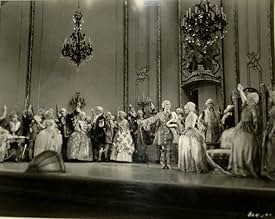ÉVALUATION IMDb
6,7/10
1,5 k
MA NOTE
Ajouter une intrigue dans votre langueA countess flees to Monte Carlo on the day of her wedding, where she is courted by a count posing as a hairdresser.A countess flees to Monte Carlo on the day of her wedding, where she is courted by a count posing as a hairdresser.A countess flees to Monte Carlo on the day of her wedding, where she is courted by a count posing as a hairdresser.
- Prix
- 3 victoires au total
Max Barwyn
- Frenchman
- (uncredited)
Billy Bevan
- Train Conductor
- (uncredited)
Symona Boniface
- Opera Chorus Singer
- (uncredited)
Sidney Bracey
- Hunchback at Casino
- (uncredited)
John Carroll
- Wedding Guest Officer
- (uncredited)
Margaret Carthew
- Opera Chorus Singer
- (uncredited)
Histoire
Le saviez-vous
- AnecdotesA silent version was produced for theaters not yet equipped for sound films. This version runs 20 minutes shorter than the sound version. The silent version was long thought lost until 1968. Historian and film preservationist David Shepard donated a copy, along with many other Paramount titles on nitrate film, to the American Film Institute.
- GaffesJeanette MacDonald is referred to as a blonde early on in the dialogue. She was actually a redhead, and no attempt was made to lighten her hair to make her look blonde. Her hair photographed the dark grey red hair usually reproduced as on the black-and-white film used in 1930.
- Citations
Train Conductor: Are you the lady who jumped on this train after we had started?
Countess Helene Mara: Yes, and I shall complain about it. Trains don't go until I get on them!
- Bandes originalesBeyond The Blue Horizon
(uncredited)
Music by Richard A. Whiting and W. Franke Harling
Lyrics by Leo Robin
Sung by Jeanette MacDonald
Commentaire en vedette
This time it's the beautiful and witty early Jeanette MacDonald, before Nelson Eddy came along - in an unusual Lubitsch romantic comedy musical! A high society romp involving financially embarrassed Countess Helene (Jeanette MacDonald) bolting during a wedding to stuffy but rich Duke Otto (Claude Allister). Her idea is to escape to Monte Carlo and gamble herself back into the upper circles, without depending on men in her life. It doesn't work out, due to many twists of the wheel as well as the plot, involving Count Rudolph (Jack Buchanan) - and Duke Otto - now both after her. Lots of sophisticated laughs at the antics of the high-born, sort of verbal slapstick. And some great music too, even beyond the blue horizon!
- dave-2395
- 14 juill. 2013
- Lien permanent
Meilleurs choix
Connectez-vous pour évaluer et surveiller les recommandations personnalisées
Détails
- Date de sortie
- Pays d’origine
- Langues
- Aussi connu sous le nom de
- Монте-Карло
- Lieux de tournage
- société de production
- Consultez plus de crédits d'entreprise sur IMDbPro
Box-office
- Budget
- 726 465 $ US (estimation)
- Durée1 heure 30 minutes
- Couleur
Contribuer à cette page
Suggérer une modification ou ajouter du contenu manquant

Lacune principale
By what name was Monte Carlo (1930) officially released in India in English?
Répondre



































